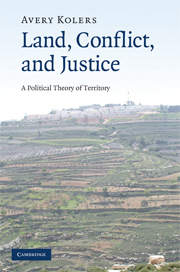Book contents
- Frontmatter
- Contents
- List of tables
- List of figures
- Foreword and acknowledgments
- Introduction
- 1 Everything you always wanted to know about taking other people's land (but were afraid to ask)
- 2 Land and territory in political theory
- 3 Groundwork
- 4 Plenitude
- 5 Territorial disputes
- 6 Implementation
- Works cited
- Index
Foreword and acknowledgments
Published online by Cambridge University Press: 07 August 2009
- Frontmatter
- Contents
- List of tables
- List of figures
- Foreword and acknowledgments
- Introduction
- 1 Everything you always wanted to know about taking other people's land (but were afraid to ask)
- 2 Land and territory in political theory
- 3 Groundwork
- 4 Plenitude
- 5 Territorial disputes
- 6 Implementation
- Works cited
- Index
Summary
Nearly everyone's back story is a saga of attachment to and alienation from land. The extent to which we are aware of this is usually the extent to which our back story is also a saga of near misses and lucky escapes. My paternal grandparents emigrated from Belarus, which has been controlled by at least four different states since they left. They were lucky to get out before the Golden Door closed, landing (like everyone else) at Ellis Island in 1918. My mother's family traces its roots in Jerusalem back to the expulsion from Spain in 1492. My mother remembers walking the long route to school to avoid tempting the Jordanian snipers atop the Old City walls. She arrived in North America in 1966. As for me, I grew up using Indian names for the city and country in which I was born and the lake on which the city sat, but learning next to nothing (or anyway, next to nothing that was true) about the prior inhabitants of the land on which I lived, or the circumstances under which it ceased to be their land.
At the same time, I have had the extreme good fortune to come out of that saga all but unscathed. Indeed, some might say that I have been too lucky: my parents are not Holocaust survivors; I have never had SCUDs or Qassams fall on my head; Canada was not, after all, torn in half by Que´be´cois secessionism, and in fact seems to be in reasonable shape. Obviously, I prefer not to think of myself as too lucky.
- Type
- Chapter
- Information
- Land, Conflict, and JusticeA Political Theory of Territory, pp. xi - xivPublisher: Cambridge University PressPrint publication year: 2009

